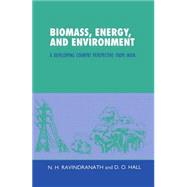Biomass, Energy, and Environment A Developing Country Perspective from India
, by Ravindranath, N. H.; Hall, D. O.- ISBN: 9780198564362 | 0198564368
- Cover: Hardcover
- Copyright: 10/19/1995
The search for alternative energy options which will promote sustainableand equitable development is an extremely topical one today. There is a greatdeal of global interest in bioenergy (conversion of biological matter to createenergy resources) as a sustainable energy source, as well as a means to reducegreen-house gas emission. This book considers these issues using India as a casestudy, extrapolating issues to create a model for analysing the potential forbiomass energy for other countries. Current sources, uses, socio-economic, andenvironmental impacts are discussed, leading to a conclusion which stresses themany benefits biomass energy holds. This is an important book, on a topicalsubject, which should attract enormous interest from all who are interested inthe environment, be they scientists, activists, or lay people. today. options topromote sustainable and equitable development. Modernized bioenergy is shown asan option with potential to meet the rural needs of a large populous countrylike India along with significant social, environmental, and economic benefits.There is a global interest in bioenergy as a sustainable energy and green housegas emossion reduciton option: This text uses India for a case study forbiomass, energy and the environment, and could be a model for analysing thepotential for biomass energy for other developing countries. The currentsources, uses, and socio-economic and environmental impacts of biomass energyare analysed for India. The energy needs for development are assessed.Conventional energy planning has not led to equitable and sustainabledevelopment. Bioenergy options are shown to have potential to meet the energyneeds of rural areas of a populous country like India. Case studies ofsuccessful bioenergy projects and economic analysis of bioenergy options arepresented. Land is not a constraint to producing woody biomass for energy evenin a densely populated country like India. Bioenergy options provide significantsocio-economic benefits along with large potential for carbon-emission reductionand promotion of biodiversity in degraded lands.The potential for bioenergy is high for developing-countries of South-eastAsia, Sub-Saharan Africa, and South America. There is global interest inbioenergy as a sustainable energy and green house gas emission reduction






